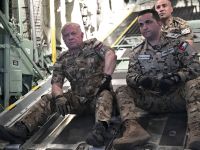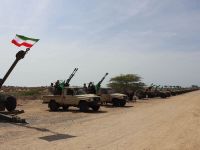A search team has discovered 16 corpses in an area of northern Iraq formerly controlled by the Islamic State of Iraq and Syria (ISIS) extremist militants, a local official said late on Wednesday.
"The joint excavation crews have discovered 16 bodies of men who were blindfolded and had their hands tied behind their backs," said the district chief Mohammed Mulla Hassan, from the Patriotic Union of Kurdistan party.
"They were found in the Kobachi area, which is part of Saadiya District, and they were executed in the past few months," he added.
A joint search team from the Kurdistan regional government in northern Iraq and Baghdad's human rights ministry made the discovery.
Hassan put the blame for the killings on ISIS militants, who controlled the area until late November when they were forced out by Shia fighters fighting on behalf of the Iraqi government.
Large swathes of land in Iraq have become ISIS strongholds as the extremist group, which declared a "caliphate" in the territory it seized in Iraq and Syria, drove Iraq's army – the recipient of $25 billion in US training and funding since the 2003 invasion – to collapse.
Since then, Iraqi forces have been trying to halt the advance of the militants and taking back territories captured.
The US-led anti-ISIS coalition has been bombing Iraq since August and has so far billed Iraq more than $260 million, despite failure to stop the advance of militants.
However, Iraqi soldiers and police, Kurdish forces, and militias have succeeded in regaining some ground from ISIS.
But large parts of the country, including three major cities, remain outside of Baghdad's control.
US officials claim the Iraqi army is being trained and armed to stage a major counter-offensive later in 2015, but in the meantime the international coalition is using air raids to pile pressure on ISIS supply lines.
The anti-ISIS campaign came almost three years after US troops completed their withdrawal from Iraq after a nine-year occupation that left the country in turmoil.
According to the Australia and US-based Institute for Economics and Peace (IEP) report in November last year, Iraq ranked first out of 162 countries on the Global Terrorism Index, with a score of 10 out of 10.
The expansion of ISIS and other extremist groups raises questions about the effectiveness of the US "War on Terror" launched by the American administration after the 9/11 attacks, which included the US invasions of Iraq and Afghanistan.
Critics opposed to US involvement in the conflict with the militants have pointed out that Washington in partnership with its Gulf allies, especially Saudi Arabia, played a role in the formation and expansion of extremist groups like ISIS by arming, financing and politically empowering rebels in Syria and Libya.
A study published in September 2014 by the London-based small-arms research organization Conflict Armament Research revealed that ISIS jihadists appear to be using US military-issued arms and weapons supplied to the “moderate” rebels in Syria by Saudi Arabia.
The report said the jihadists disposed of "significant quantities" of US-made small arms including M-16 assault rifles and included photos showing the markings "Property of US Govt."
In 2014, violence in Iraq killed more than 17,000 civilians and security personnel. And in just the first 12 days of 2015, the killings of 519 civilians have been documented, as bloodshed continues since the 2003 US invasion.








